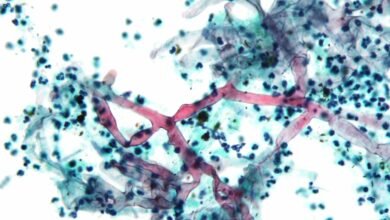Fungal infection treatment could get a boost with newly-identified gene

Indian, French scientists identify gene that could help cure Candidiasis in immuno-compromised patients
Candidiasis is a fungal infection that affects intensive-care unit (ICU) patients, cancer patients and patients receiving immunosuppressive therapy. Research had been on to quell the onslaught of this fungal infection, and a team comprising Indian scientists of repute have now found a breakthrough in this domain. A newly identified gene can hold the key to prevent the fungal infection, it has been proved.
The gene, named CSA6, has been identified in Candida albicans, which is a fungal species that caused high rates of morbidity and mortality under certain immuno-compromised conditions such as AIDS or during cancer treatment.
Medical research has proved that this fungal species, found in mucosal linings of the gastrointestinal and urogenital tract of healthy individuals, turns into a pathogen under immuno-compromised conditions. These pathogens pierce through the defence mechanisms of the host, giving rise to life-threatening systemic infection.
CSA6 gene identified through a collaborative study
A collaborative study, published in Nature Communications, by Professor Kaustuv Sanyal and his team at the Jawaharlal Nehru Centre for Advanced Scientific Research (JNCASR), Bengaluru, and Christophe d’Enfert’s group at Institut Pasteur, Paris, France, has revealed this breakthrough in the medical arena, through a study undertaken to identify regulators of chromosome stability in C. albicans, a clinically relevant fungal model system. JNCASR is an autonomous institute of the Department of Science and Technology (DST).
The study authors, reportedly, screened the effect of overexpression of more than a thousand genes of C. albicans on genome stability. They were successful in identifying a set of six chromosome stability (CSA) genes that are important for maintaining genome integrity. While five of the CSA genes identified in the study are known to be important for cell division in other species, the sixth CSA gene, named CSA6 encoded for a protein that is essential for viability in C. albicans. They found that Csa6 was a critical regulator of cell cycle progression wherein both overexpression and deletion of Csa6 lead to reduced growth of C. albicans cells.
Offers potential treatment avenues sans side effects in humans
The study represents the first-ever report of such an extensive screen in the human fungal pathogen C. albicans. It identifies and elucidates the functions of a novel regulator of chromosome stability that is exclusively present in a group of medically relevant human fungal pathogens.
It also provides a systematic scheme for identifying genes whose products may serve as potential therapeutic interventions for fungal infections by posing lesser adverse effects on humans. Small molecule modulators that alter expression levels of the gene called Csa6 offer potential avenues for treatment with no side effects in humans.







